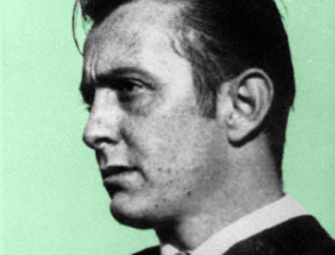
Novelist John Fante writes to Carey McWilliams, political journalist and future editor of The Nation magazine, to discuss a new novel and share some alarming thoughts about Filipino Americans.
Dear Carey,
The milk of Hollywood realism having curdled, I fled the town to this Terminal Island. Why it is called that I can’t make out, for geographically speaking it is not an island but a peninsula. It is very much a part of the mainland, and from my place here at the seashore I can walk unimpeded along the coast to Long Beach.
I have started another book. This time I am a bit cagey in my predictions. I can only say that I have definitely got a good start. But unlike my last venture in novel-writing, I can see the book in many phases beyond my present position. It is autobiographical, of course. I am not trying to prove or disprove anything in it, but it moves along quite solidly for all that, and here and there sparks fly. I can truthfully say that I know one thing about novel-writing: reconcile yourself to the routine of disappointments. A phrase or paragraph that has a thrilling ring to it in the morning may stink like a dead cow by evening. I found that out with a bang, with a good number of bangs. And so I have decided to stay away from re-reading as much as possible.
My diversions here are the beach and the Filipinos. I take a long sunbath every afternoon and the effects are noticeable and splendid. My belly is going down and I’m dead tired and eager for sleep around eleven every night. So far it’s a cheap and pleasant way to live. But ach! I’ve only been here a week. Unless something happens at M.G.M., where a story of ours (Fenton and I) is now under consideration, I’m pretty sure I’ll stay here until I finish the first draft of the novel. So far we have heard nothing, but that means nothing. If it sells we may have to go to work on it.
A spectacle that has me by the ears here on the Island is the Filipino scene. Once before I was interested in them to the point where I almost wrote a piece about them, but that was a couple of years ago, when my reportorial sense was as acute as a barber-pole, and I had to give up with disgusting relief. I couldn’t get the facts I wanted, which had to come from the Filipino himself, and their disorganization was so complete, they themselves so hostile toward one another and so suspicious of me and my blunt questions, that I finally realized I had tackled the subject from the wrong direction. But if I had the wrong slant, what was the right slant? I didn’t know then. I know now.
I have come to the conclusion that the Filipino is a pathetic species hopelessly out of the American pale. There are not many of them, perhaps not more than 125,000 in the United States, but their outcast existence, their diversions, labors and loves, are so curious that they form a mountain of grotesque Americana. Fundamentally of course they are no better or worse than any people, but once they land in California a lot of things happen to that fundamental condition. They try their goddamnedest to become Americanized, yet in the most ludicrous and superficial manner. Frank Fenton once called them “Little Clark Gables.” Which is about true. For a hundred reasons those poor little guys haven’t a ghost of a chance in this country. For example, the most “successful” among them are individuals who reach the sport pages: Speedy Dado, and Cefereno Garcia. Pugs! And then there is that marvelous folk-lore the American workingman has built up for the Filipino. Nine out of ten Americans who work side by side with the Filipino in canneries and lettuce field—the hundred-percenter—believe the Filipino is “queer,” is successful with American women because he is a cunt-licker, because he “lavishes” money on them; in fact a score of reasons false, without once mentioning that perhaps American girls simply like Filipinos for what they are: clean, primitive, sensual, soft-hearted little guys who need a woman even as you and I…all this is great stuff, and while I’m here I’m laying up some notes on it.
Affectionately,
John


